Author: Lucas Matney, Bankless author; Translator: LianGuaixiaozou
After years of hype, confusion, and controversy, WorldCoin has finally launched.
This bold move aims not only to create a unified human online transaction database through the iris scanner orb verification, but also to create a widely accessible cryptocurrency payment system that can immediately reward users with tokens to incentivize them to join the network.
After the launch of Worldcoin, it reached a fully diluted value (FDV) of $22 billion, a number that puts the network’s maximum token count higher than most other fixed-supply cryptocurrency projects such as Solana, Optimism, and Arbitrum.
- Comprehensive Dissection of Coinbase’s Four Major Businesses The Birth of the Next Trillion-Dollar Enterprise?
- What is the number one focus of LianGuairadigm? What is intent-centric all about?
- Revealing the Unknown Side of Worldcoin What is the Real Purpose of Iris Scanning?
We recently interviewed Worldcoin founders Sam Altman and Alex Blania. The conversation focused primarily on the project’s ideas and execution, as the project faces many obstacles to widespread adoption, with one of the major obstacles being significant resistance from the cryptocurrency industry – so what exactly happened?
After the high-profile launch of Worldcoin, the community voiced their opinions; only a few people expressed support for the token, while most expressed concern about its various potential issues.
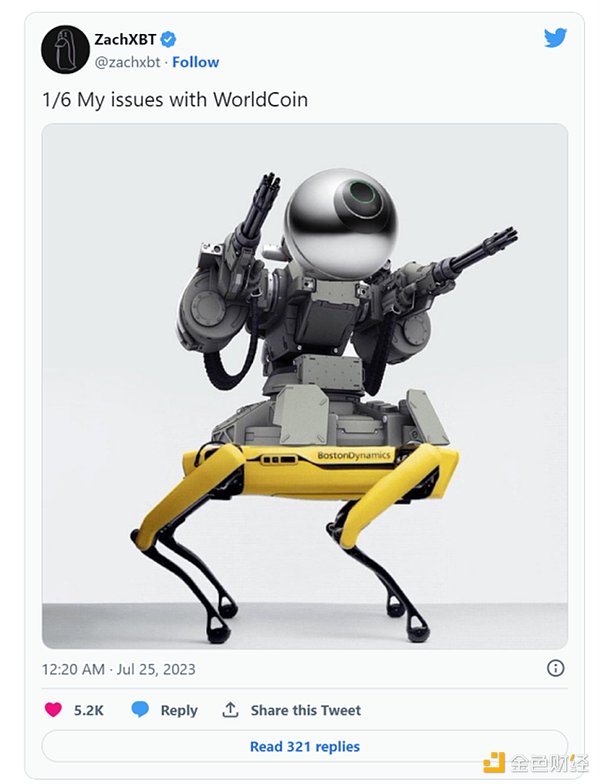
The criticisms of Worldcoin can be broadly divided into two categories:
– Inherent criticisms of biometric “personhood proof” and Worldcoin’s implementation
– Inherent criticisms of the WLD token and its distribution
1. Real People
Let’s look at the first criticism. Vitalik Buterin wrote a lengthy blog post on this topic. It’s worth a read, as expected.
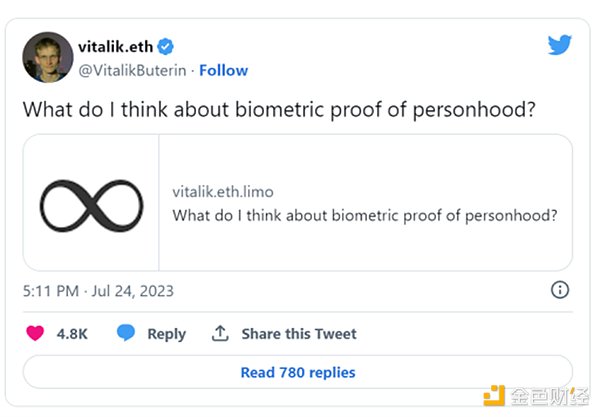
Personhood proof is as fascinating, complex, and controversial as it sounds. Vitalik Buterin has said a lot, emphasizing the many problems that potential decentralized solutions face. He did not directly comment on Worldcoin in the article, but he also did not directly criticize, which is more generous than most people.
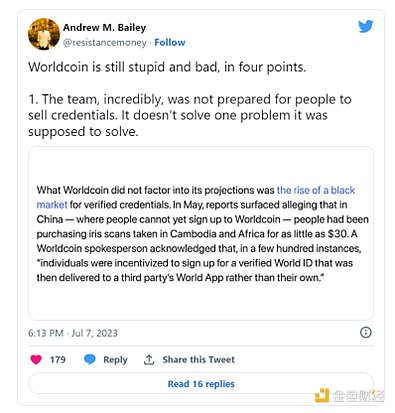
The scope of the criticism reflects the complexity of the project. Frankly, it’s surprising that Worldcoin has come this far. Without Altman’s involvement, it definitely wouldn’t have developed to this point. Worldcoin has become a social token closely linked to Altman’s other projects’ expected success.
In many ways, Worldcoin’s value is inherently connected to the AI revolution led by Altman during his time at OpenAI. An internet filled with machines that resemble humans more means that you can no longer be sure if the entity influencing you online is a real human or part of a massive, intricate bot network. This is already quite disruptive today. With Worldcoin’s World ID identity proof solution, you will be able to differentiate whether an online entity is a real person or AI – at least theoretically.
The reality is that such a solution may inevitably emerge soon.
Vitalik Buterin’s blog provides more detailed descriptions on this matter. A deeper online world is forming. Yes, the internet identity system is like a Russian nesting doll with dystopian risks, and we shouldn’t rush to take any actions. Meanwhile, waiting for the perfect solution may ultimately result in government support for the worst-case scenario.
However, the reality is that if the US government wants to gain full public support to create such a solution, it may lead to quite disastrous consequences (in my opinion). Fortunately, despite the government’s best efforts, they are still quite incompetent in leading the technological dystopia curve (on their own).
The most likely short-term solution to the above-mentioned problem may come from existing centralized tech giants like Apple. It is commendable that Apple has been quite meticulous in creating privacy-protecting, trustless biometric verification for their products. How this capability and good intentions apply to managing this completely different problem is a challenge that Apple itself must face, just as they have to consider whether there will be short-term business interests in solving identity proof issues and, more importantly, whether they can avoid government backdoors.
Attempting to achieve a decentralized alternative solution is obviously more desirable in terms of ideology, but it is a challenge.
Now, many criticisms of Worldcoin are about the trust that must be given to various participants in the value chain, each of whom has their own motives (is the operator of my Orb malicious? Is the manufacturer of my Orb malicious?).
The biggest concern being discussed today is whether Worldcoin is absorbing millions of eyeball scans and holding all the biometric keys and their associated identity links. Worldcoin insists that they do not hold these scans, but rather the hash values generated by them, which will prevent real-world identities from being matched with World IDs. These words have not satisfied the critics waiting for answers to edge cases, but further criticism ultimately boils down to doubts about the project: does this project only need to provide an unacceptable level of trust to so-called “decentralized” options?
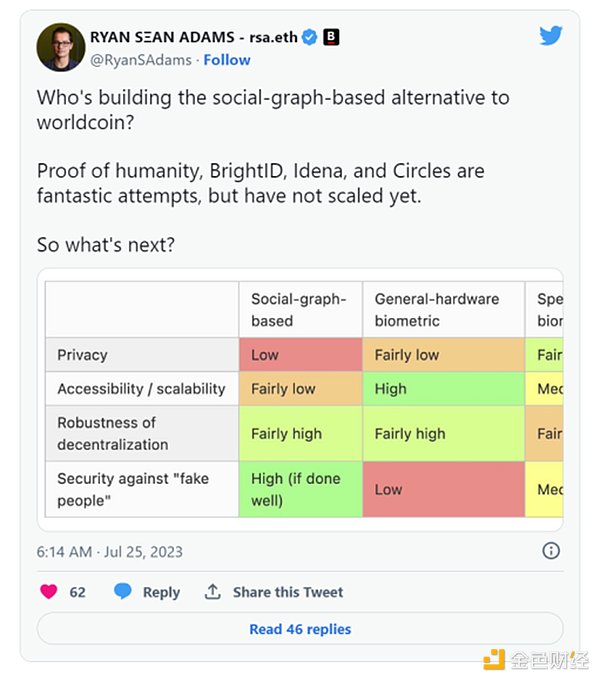
The centralized quirks of Worldcoin (not all of them) make it feel crucial to establish a company that solves identity proof issues in this way. This company encounters problems that other similar startups may also encounter, so the question becomes whether for-profit startups are suitable for building solutions in this field, or if a less precise, social graph-based decentralized approach should be adopted if this incentive structure becomes too widespread and less susceptible to exploitation, or if once the use cases of such a system become clearer, we should attempt to have thoughtful construction by mobile giants like Google or Apple.
Developing towards centralization and expecting the best outcome is clearly not a good choice, although people should also question whether it is really the best choice to allow the successors of large technology companies and well-known venture capitalists to hold excessive governance power in a decentralized system.
2. WLD Whale
To be honest, a few weeks ago my iris was scanned by Orb! (In the end, there were 25 OrbBucks waiting for me, which was not enough to affect my view of the project) I have always been an early adopter of technology, and perhaps over time, I may regret this choice, but I also believe that relative to other issues of the project, the fixed amount of iris scanning/hash elements in this stack is a bit strange.
Such as… the WLD token itself.
It is reported that Worldcoin has raised a large sum of money, exceeding 500 million US dollars, from venture capitalists. Many token ecosystems rely on pre-mining or institutional sales to obtain early development funds, while these ecosystems hardly rely on the marketing term “universal basic income.”
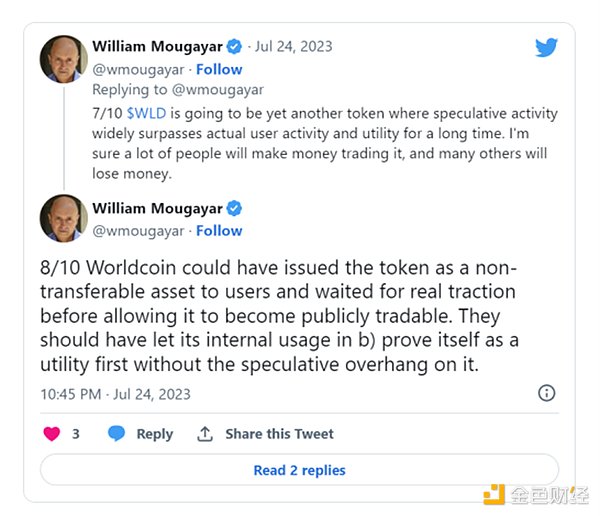
A speculative UBI token has been largely pre-allocated to private investors and insiders, which is morally ambiguous. This is obviously a capital-intensive vision, and a new startup cannot succeed without raising a large amount of cash. But perhaps we should not accept the initial distribution of 25% of the tokens to insiders, but instead focus on whether this incentive structure can solve this problem.
The platform opportunity is so huge that people cannot help but ask why a team co-founded by one of the most outstanding figures in the tech industry is so dependent on token authorization.
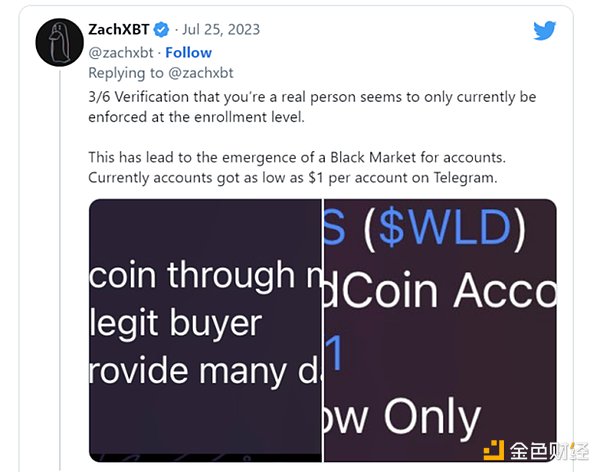
Technology always finds ways to monetize public infrastructure investments. In the past decade, Facebook has spent billions of dollars funding satellite internet in Africa. Their goal has never been to profit in the process, but to hope that when their service attracts customers from a new continent, the platform opportunity will arise.
If a project like Worldcoin succeeds and achieves decentralization, its infrastructure will still have ample profit opportunities.
3. Conclusion
I’m not sure if the crypto community should give Worldcoin a chance.
To be honest, all of this feels quite chaotic! However, I think it is important to realize that regardless, proof of personhood is an important issue that needs to be addressed, even though it is very challenging.
Just because you think the issue of proof of personhood is important, it doesn’t mean that Worldcoin is worth your support. You need to look at the vision of the world shaped by its implementation and distribution, and then decide if it is the world-wide coin you want.
Like what you're reading? Subscribe to our top stories.
We will continue to update Gambling Chain; if you have any questions or suggestions, please contact us!